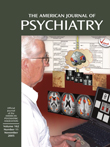Risk Factors for Suicide Completion in Major Depression: A Case-Control Study of Impulsive and Aggressive Behaviors in Men
Abstract
OBJECTIVE: Major depression is a major risk factor for suicide. However, not all individuals with major depression commit suicide. Impulsive and aggressive behaviors have been proposed as risk factors for suicide, but it remains unclear whether their effect on the risk of suicide is at least partly explained by axis I disorders commonly associated with suicide, such as major depression. With a case-control design, a comparison of the level of impulsive and aggressive behaviors and the prevalence of associated psychopathology was carried out with control for the presence of primary psychopathology. METHOD: One hundred and four male suicide completers who died during an episode of major depression and 74 living depressed male comparison subjects were investigated with proxy-based interviews by using structured diagnostic instruments and personality trait assessments. RESULTS: The authors found that current (6-month prevalence) alcohol abuse/dependence, current drug abuse/dependence, and cluster B personality disorders increased the risk of suicide in individuals with major depression. Also, higher levels of impulsivity and aggression were associated with suicide. An analysis by age showed that these risk factors were more specific to younger suicide victims (ages 18–40). A multivariate analysis indicated that current alcohol abuse/dependence and cluster B personality disorder were two independent predictors of suicide. CONCLUSIONS: Impulsive-aggressive personality disorders and alcohol abuse/dependence were two independent predictors of suicide in major depression, and impulsive and aggressive behaviors seem to underlie these risk factors. A developmental hypothesis of suicidal behavior, with impulsive and aggressive behaviors as the starting point, is discussed.



